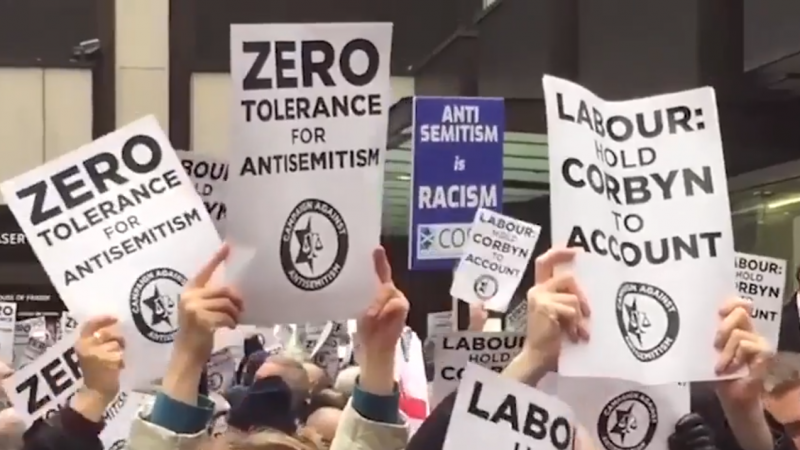Jeremy Corbyn’s subsequent comments and ensuing suspension has unfortunately come to overshadow the substance of the EHRC report.

The release of last Thursday’s EHRC investigation into the Labour Party turned out to be tumultuous. The report was damning and unequivocal and found that the Party had breached equality law on three specific occasions, but that this was just the ‘tip of the iceberg’ of Labour’s problems with antisemitism. The findings vindicated the concerns of many within the Jewish community, both inside and outside the Labour Party.
Jeremy Corbyn’s subsequent comments and ensuing suspension has unfortunately come to overshadow the substance of the EHRC report. Despite the reported behind the scenes attempts by the Leader’s Office to avoid a damaging factional battle, Corbyn’s repeated statements stood in stark contrast to the strong words in Keir Starmer’s statement that there was no place in Labour for those denying the extent of the problem. Corbyn’s case is now due to be investigated independently, without the involvement of the Leader’s Office. News of his suspension was a moment of emotional release for many in the Jewish community and Labour membership. A snap YouGov poll found that 58% of the public thought it was the right decision.
But as the Jewish Labour Movement and Margaret Hodge stated – Corbyn is yesterday’s man, and our focus must now be on the future. The attempt by those around Corbyn to frame him as an innocent victim must be set aside in order to focus on the task at hand – to show by action not just words that there is no place in the Labour Party for antisemitism. The EHRC’s report shed much needed clarity on where the structures and processes had failed and what needs to change, but its recommendations should be considered the bare minimum.
To begin with, there must be a culture change, led from the top. Where in the past there was obfuscation and equivocation, Kier Starmer has been forthright and unambiguous. There now needs to be zero tolerance of antisemitism anywhere in the Labour Party, whether within the leadership team, the Parliamentary party, local councillors or constituency activists.
Labour must develop a new, independent complaints process for all forms of discrimination, racism and prejudice – and complaints of antisemitism should be guided by the IHRA definition. The Party must now recognise that transparency is required in all it’s processes and reporting.
This is the right thing to do. It is also an important change to re-establish trust, particularly for those who have had no faith that any complaint made would be listened to and dealt with appropriately.
The EHRC report identified serious failings in the area of training. An ambitious programme of training, created, as EHRC states, in consultation with Jewish stakeholders, will be fundamental in making progress to ensure that firstly, decision makers and those receiving complaints are well equipped to act appropriately and with empathy. As the report states: “The Party’s provision of academic education rather than practical training fails to equip decision-makers with the knowledge and skills they need.”
Secondly a wider plan of training will help Labour’s members to have the tools to understand and deal with left-wing antisemitic tropes where they manifest. Ignorance of both historic and contemporary antisemitism meant many on the left are either drawn into reproducing and amplifying these toxic narratives or left unable to counter them.
However, a history lesson is not enough. To be effective, training must also be given to help members self-reflect, show vulnerability and ask questions when they find their preconceptions challenged by someone else’s lived experience.
Most importantly, the Labour Party must work hard and purposefully to further repair the relationship between the Party and the many sections of the Jewish community that it has alienated itself from. That includes supporting the Jewish members who were left isolated, and in many cases victimised and harassed, because of the Party’s previous inability to tackle this problem robustly. Jewish members were dismissed, ignored and smeared, and it is only through their determination and persistence that we have got to this point today. The Party owes them a debt of gratitude.
Ultimately, this is an opportunity for the Labour Party to seriously reflect and reform and take all steps necessary to become an inclusive and welcoming party for all, free from harassment and intimidation. It is an opportunity to be a force for positive change in challenging not just antisemitism, but anti-Black racism, Islamophobia, misogyny, transphobia and every other inequality we face in society. Labour is not the only political party to have serious issues with racism and inclusivity within its ranks. But as shameful as this period has been, the Labour movement can take the painful lessons it has learnt and use them to build a party where everyone not just feels welcome, but where every voice is heard, and every person’s unique contribution is valued.
Jemma Levene is HOPE Not Hate’s Deputy Director.
Left Foot Forward doesn't have the backing of big business or billionaires. We rely on the kind and generous support of ordinary people like you.
You can support hard-hitting journalism that holds the right to account, provides a forum for debate among progressives, and covers the stories the rest of the media ignore. Donate today.



